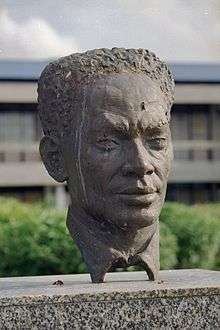Anton de Kom
| Anton de Kom | |
|---|---|
 | |
| Born |
Cornelis Gerhard Anton de Kom 22 February 1898 Paramaribo, Suriname |
| Died |
24 April 1945 (aged 47) Sandbostel, Germany |
Cornelis Gerard Anton de Kom (22 February 1898 – 24 April 1945) was a Surinamese resistance fighter and anti-colonialist author.
Biography

De Kom was born in Paramaribo, Suriname, to farmer Adolf de Kom and Judith Jacoba Dulder. His father was born a slave. As was not uncommon, his surname is a reversal of the slave owner's name, who was called Mok.
De Kom finished primary and secondary school and obtained a diploma in bookkeeping. He worked for the Balata Compagnieën Suriname en Guyana. On 29 July 1920 he resigned and left for Haiti where he worked for the Societé Commerciale Hollandaise Transatlantique. In 1921, he left for the Netherlands. He volunteered for the Huzaren (a Dutch cavalry regiment) for a year. In 1922 he started working for a consultancy in The Hague. One year later he was laid off due to a reorganization. He then became a sales representative selling coffee, tea and tobacco for a company in The Hague, where he met his future wife, Nel. In addition to his work, he was active in numerous left-wing organizations, including nationalist Indonesian student organisations and Links Richten (Aim Left).
De Kom and his family left for Suriname on 20 December 1932 and arrived on 4 January 1933. From that moment on he was closely watched by the colonial authorities. He started a consultancy in his parents' house. On 1 February he was arrested while en route to the governor's office with a large group of followers. On both 3 and 4 February his followers gathered in front of the Attorney General's office to demand De Kom's release. On 7 February a large crowd gathered on the Oranjeplein (currently called the Onafhankelijkheidsplein). Rumor had it that De Kom was about to be released. When the crowd refused to leave the square, police opened fire, killing two people and wounding 30.
On 10 May De Kom was sent to the Netherlands without trial and exiled from his native country. He was unemployed and continued writing his book, Wij slaven van Suriname (We Slaves of Suriname) which was published in a censored form in 1934. De Kom participated in demonstrations for the unemployed, traveled abroad with a group as a tap dancer, and was drafted for Werkverschaffing (unemployment relief work), a program similar to the American WPA, in 1939. He gave lectures for leftist groups, mainly communists, about colonialism and racial discrimination.
After the German invasion in 1940, De Kom joined the Dutch resistance, especially the communist party in The Hague. He wrote articles for the underground paper De Vonk of the communist party, mainly about the terror of fascist groups in the streets of The Hague (much of their terror was directed against Jews). On 7 August 1944, he was arrested. He was imprisoned at the Oranje Hotel in Scheveningen, and transferred to Camp Vught, a Dutch concentration camp. In early September 1944, he was sent to Oranienburg-Sachsenhausen, where he was forced to work for the Heinkel aircraft factory. De Kom died on 24 April 1945 of tuberculosis in Camp Sandbostel near Bremervörde (between Bremen and Hamburg), which was a satellite camp of the Neuengamme concentration camp. He was buried in a mass grave. In 1960, his remains were found and brought to the Netherlands. There he was buried at the Cemetery of Honours in Loenen.
De Kom was married to a Dutch woman, Petronella Borsboom. They had four children. Their son, Cees de Kom, lives in Suriname.
The University of Suriname was renamed The Anton de Kom University of Suriname in honor of De Kom.
Anton de Kom was listed in De Grootste Nederlander (The Greatest Dutchman/Dutchwoman) as #102 out of 202 people.
In Amsterdam Zuidoost a square is named after him, the Anton de Komplein. It features a sculpture of Anton de Kom as a monument to his life and works, sculpted by Jikke van Loon.
-

Anton de Kom Street in Paramaribo
-

Anton de Kom civic building, Amsterdam
-

Monument to Anton de Kom, Amsterdam
Written work
- Anton de Kom: Wij slaven van Suriname (1934; uncensored edition 1971). English translation: We Slaves of Surinam, 1987 (Publisher: Palgrave Macmillan).
External links
- antondekom.nl website devoted to the Anton de Kom square and monument.